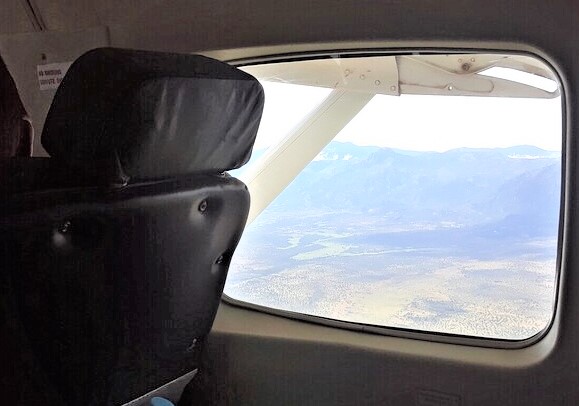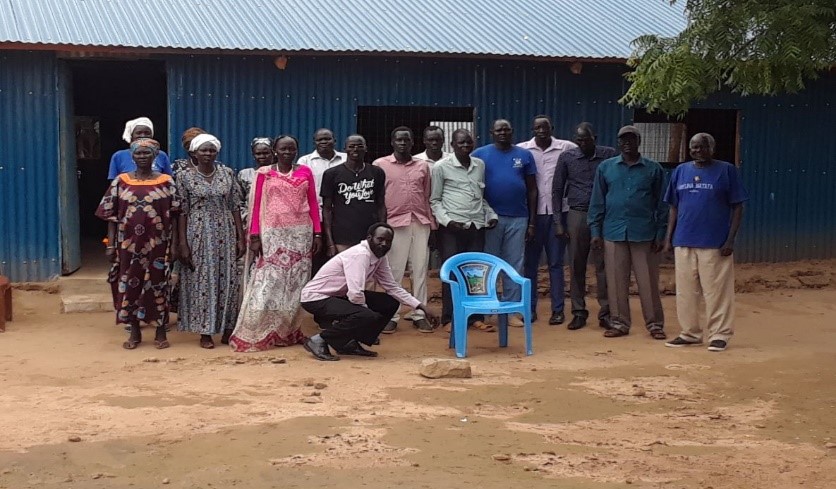A Letter from Lynn and Sharon Kandel, regional liaisons for the Horn of Africa, based in South Sudan
November 2019
Write to Lynn Kandel
Write to Sharon Kandel
Individuals: Give to 200524 for Lynn and Sharon Kandel’s sending and support
Congregations: Give to D507585 for Lynn and Sharon Kandel’s sending and support
Churches are asked to send donations through your congregation’s normal receiving site (this is usually your presbytery)
I’ve been planning a trip to the Kakuma refugee camps in Kenya for the last year and it’s finally time to go. Sharon and I know many people whose families are in Kakuma while the husband/father lives and works in a different location. Kakuma, I have always thought, seems like a long distance from the various locations that the refugees used to call their home. The primary reason for my trip, as Regional Liaison for the Horn of Africa, is to visit our church partners there. They are The Giffen Institute of Theology and the Presbyterian Relief and Development Agency (PRDA) Midwifery School.
I’m told check-in time for the flight that will eventually take me to Kakuma is 7:00 a.m. Knowing that in Africa this really means about 7:15 or 7:20, nevertheless I can’t make myself arrive 20 minutes later than I would if I were in the U.S. where we stick to our strict time schedules. I arrive at 7:05 a.m. and, of course, I’m the first person there, almost arriving before the airline employees. I’m flying on Mission Aviation Fellowship (MAF on a flight that usually stops in three or four locations and finally lands in Lokichogio, Kenya. This flight takes us past the highest point in South Sudan, which is Mount Kinyeti in the Imatong Mountains. Four hours after leaving Juba we arrive in the Kenya border town of Lokichogio. My memories go back to 1980 which was the first (and last) time I was in Lokichogio. Loki, as it’s called, sticks in my memory since I traveled to Juba through Loki from Nairobi by truck those many years ago. When we arrived in Loki that day in 1980, we struggled to gain clearance to proceed on to Juba. Loki is much more welcoming this time though, and the immigration and custom clearance is seamless! After a quick lunch I board the MAF plane that has come from Nairobi, and arrive in Kakuma, Kenya twenty minutes later. Entering the Kakuma camps requires an invitation from one of the organizations that is working in the camps, and clearance from the Camp Manager’s office. I happen to arrive at the Manager’s office about ten minutes after he has left for lunch on a Friday! My hosts who came to the plane to meet me help me through the process. This involves approximately three hours of waiting under an open air shelter made of wooden poles and sheet metal roofing in 100 degree heat. This would seem like a waste of time to most westerners, but I take advantage of the time to get to know my hosts better and to find out more about Kakuma. This is, after all, the purpose of my trip!
Kakuma is a strange mix of approximately 185,000 people from many different locations and cultures. The camps are a hodgepodge of mostly sheet metal buildings with some permanent structures. There are schools, churches, small stores, cafes, and other businesses in the camps. There are people here from South Sudan (the largest group), Somalia, Congo, Ethiopia, Eritrea, Sudan, Tanzania and a number of other countries. Some of the refugees have been here since the early 1990s. Many also were born in the camps and have never experienced life outside the camps. Logic seems to say that people would be anxious to leave the camps and return to their home countries, but this doesn’t seem to be the case. Some have hopes of returning home but are in no hurry to do so. Others are hoping to be relocated to a country where there is more opportunity, such as in Europe or the U.S., as the “Lost Boys from South Sudan” were in the past. The camps seem to be separated from the realities of the rest of the world and take on a life of their own. Not only are the camp refugees dependent on those who supply their needs, such as food and shelter, but the organizations that supply the refugees such as the United Nations High Commission for Refugees (UNHCR) also become dependent on the refugee system which is supported by donor countries. The camps create many opportunities for employment that would not otherwise exist. Some of the refugees are there, not because of conflict in their home communities, but are instead economic refugees fleeing from the poverty of their home areas. Life in the camps may include education, food, and shelter that are impossible to find in the broken home countries the refugees left behind.After several days at the Kakuma Camp it’s time for me to return to Juba, South Sudan where I live. As I go through immigration in Loki on the return trip there is a man clearing immigration just ahead of me. I recognize him as a Nuer from South Sudan by his facial markings. I greet him in the Nuer language and we have a brief conversation (in English). He is on his way to Kakuma to see his family, which he hasn’t seen in six years! He moved his family there in 2013 when the civil war started in South Sudan. Imagine not seeing your wife and children for six years! I am grateful to God for being born in a place where these problems are not found and opportunities are more abundant. Pray for those who are less fortunate and struggle to survive in difficult circumstances!
Lynn Kandel
Please read this important message from Sara Lisherness, interim director of Presbyterian World Mission
Dear friend of Presbyterian Mission,
Greetings in Christ! As the interim director of Presbyterian World Mission, I am grateful to have the opportunity to thank you for your continued support of PC(USA) mission co-workers.
The enclosed newsletter bears witness to some of the many ways in which God is at work in the world through long-standing relationships between global partners and the PC(USA). These partnerships are nurtured and strengthened by the presence of mission co-workers in over 40 countries; you are an important part of this partnership too, as you learn about and share how our church is involved in global ministry; as you pray for our partners and mission co-workers; and as you take action to work with others for God’s justice, peace and healing.
I write to invite you to continue joining us in partnership in three ways. First, your prayers are always needed. Please pray that God will continue guiding the shared work of the PC(USA) and global partners as we engage together in service around the world. Pray, too, for mission co-workers, that they may feel encouraged in the work they are doing under the leadership of global partners.
Second, please consider making a year-end gift for the sending and support of at least one mission co-worker. There is a remittance form at the end of this letter and an enclosed envelope so that you can send in a special year-end gift.
Finally, I encourage you to ask your session to include one or more mission co-workers in your congregation’s mission budget for 2020 and beyond. PC(USA) mission co-workers’ sending and support costs are funded by the designated gifts of individuals and congregations like yours; your gifts allow Presbyterian World Mission to fulfill global partners’ requests for mission personnel.
Faithfully in Christ,
Sara Pottschmidt Lisherness
Director, Compassion, Peace and Justice Ministry
Interim Director, Presbyterian World Mission
![]() You may freely reuse and distribute this article in its entirety for non-commercial purposes in any medium. Please include author attribution, photography credits, and a link to the original article. This work is licensed under a Creative Commons Attribution-NonCommercial-NoDeratives 4.0 International License.
You may freely reuse and distribute this article in its entirety for non-commercial purposes in any medium. Please include author attribution, photography credits, and a link to the original article. This work is licensed under a Creative Commons Attribution-NonCommercial-NoDeratives 4.0 International License.

